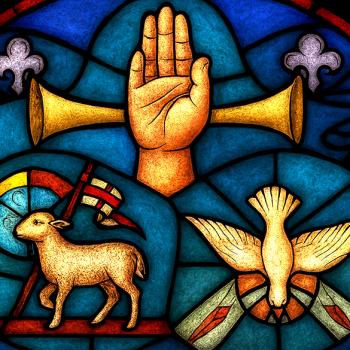
"Blessed are the peacemakers: for they shall be called the children of God."
As Christ taught in His Sermon on the Mount, blessed peacemakers assume sacred responsibility. Today, more than two centuries later, our world sometimes feels like a sphere of contention. Physical, mental, emotional, verbal, and other forms of violence are rampant worldwide. Even nature is in turmoil.
As Christians, we want to serve God and to preserve our fellow mortals. But making peace in these circumstances can seem beyond our abilities. However, we are not limited to our abilities. Recall the words of Paul: "In every thing by prayer and supplication with thanksgiving let your requests be made known unto God" (Philippians 4:6). "Prince of Peace" is one of Christ's names.
A “peacemaker is someone who reconciles people with God and with one another," wrote Dolores Smyth, a nationally published author on faith and parenting. She continued, "Peacemaking, as such, requires taking the initiative to get involved in conflicts with the intention of building bridges between the parties at odds.
We suggest that there may be as many ways of making peace as ways of creating contention, possibly as many kinds of peacemakers as there are peacebreakers. We discuss some ways and examples we have found in the scriptures and in writings of religious leaders.
Peacemaking With Self-Control
The Savior told his apostles as he was preparing to leave them, "Peace I leave with you, my peace I give unto you: not as the world giveth, give I unto you. Let not your heart be troubled, neither let it be afraid" (John 14:27).
Anger and Contention
Today we can't trust what the world will give us. Quentin L. Cook, a lawyer turned Christian leader and administrator, expressed regret. "World peace and harmony are not prevalent in our day. In my lifetime, I have never seen a greater lack of civility. We are bombarded with angry, contentious language and provocative, devastating actions that destroy peace and tranquility."
"Anger never persuades," wrote Russell M. Nelson, who leads a worldwide Christian denomination. He continued, "Hostility builds no one. Contention never leads to inspired solutions." He gave us a more Christian perspective:
Contention is a choice. Peacemaking is a choice. You have your agency to choose contention or reconciliation. I urge you to choose to be a peacemaker, now and always . . . If your verbal arsenal is filled with insults and accusations, now is the time to put them away. You will arise as a spiritually strong man or woman of Christ.
He urged us to find "a peaceful, respectful way to resolve complex issues and an enlightened way to work out disagreements."
The Bible is full of peacemakers, though the sign is not usually waved over them as they did so many other outstanding things as well.
Peace of a Warrior
We often focus on King David as a man of war, with his 40 years of successful leadership and victories. He could certainly deal with conflict. But historical and religious analysts remind us that he was also a dedicated peacemaker. David Mathis titled a conference presentation "Man of War and Grace." He concluded, "It was God’s gentleness that made David great."
David played his harp as part of his own worship, and he played the harp to soothe the troubled mind and the sleepless spirit of his predecessor, King Saul. The king was trying to kill David, but he needed David's music. That the music carried on as the musician was protecting himself from the sufferer's state of anger, fears, and jealousy shows vividly David's level of peacekeeping self-control.
1 Samuel 24 and 26 show specific incidents of his supreme control. David knew he was anointed to follow Saul as king, and on these occasions he came upon Saul completely vulnerable. But as Mathis detailed, he chose "not to reach out his hand against God’s [previously] anointed to seize the kingdom." Thus "he waited for years on end for the kingship to fall to him. Trusting in God and his timing, in manly humility and the godly gentleness that flows from it, David let Saul go."
David was also a blessed peacemaker in showing kindness to Saul's family, which David referred to as "the kindness of God" (2 Samuel 93).
One of David's experiences with peacemaking affected positively the rest of his life. Abigail has been described as "a humble woman who was married to a wealthy scoundrel." When David asked her husband, Nabal, for food needed for his army, Nabal refused with an insult. David was thinking about punishment, when Abigail showed up bringing donkeys laden with the desired food. She asked only that her house be spared and David remember her. David remembered Abigail all right: when Nabal died soon afterward, Abigail became David's second wife.
A Person of Peace
When entering a village, Christ instructed His followers, they should seek first a worthy "person of peace," as reported by Tom Marshall (a Christian college professor and dean), to "open the way for the gospel to enter [their] social group or even their village" (see Matthew 10:11; Luke 10:6).
The Book of Acts includes examples of persons of peace supporting and helping the apostles, who would remain in their home while in the area. This blessed peacemaker was not merely a host(ess) or provider. The roles of a person of peace were active, not passive, matters.
Bible-studying Christians are well acquainted with Lydia, person of peace for Paul, Timothy, Luke, and Silas when one or more were in Philippi. She believed in and worshipped God; and her "heart the Lord opened, that she attended unto the things which were spoken of Paul" (Acts 6:14). She was strong, and Paul needed someone who was strong.
Lydia was "honoring the Sabbath" with several other women at a place of prayer near a river outside Philippi when Paul, Timothy, Luke, and Silas walked over to speak to them. The website referenced attached Christ's words, "No one can come to me unless the Father who sent me draws them” (John 6:44). Lydia was definitely drawn by God.
As recorded in Acts 16:15, "when she was baptized, and her household, she besought us, saying, If ye have judged me to be faithful to the Lord, come into my house, and abide there. And she constrained us." No one of them could possibly question her faith. And she didn't just invite or request—she besought and she constrained.
That kind of living environment clearly was ideal for the apostles, though their assignment would eventually be to travel on, and they did so.
Conclusion
Christ demonstrated that He was the ultimate peacemaker, but He also taught us to act like Him. In the Sermon on the Mount, He identified the person who took responsibility for reconciling conflicts as blessed.
Peacemaking can be described as active work and requires patience and loving kindness, and the challenges associated with the efforts and sometimes failure make it a sacred responsibility.
It is essential to recognize our capacity to change the world for the better, not with temporal power, but with God’s guidance and strength in being peacemakers. Think carefully about the examples of peacekeeping above. What can you do?
9/17/2024 8:47:00 PM




